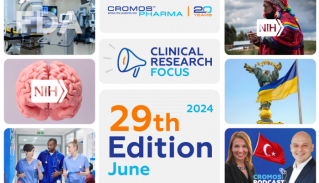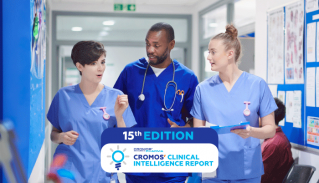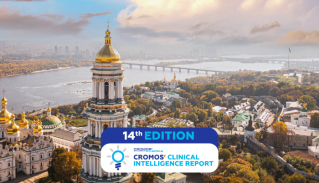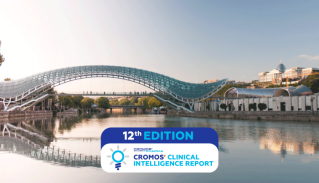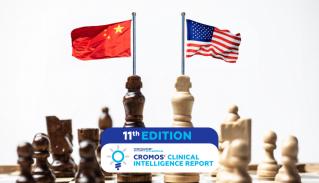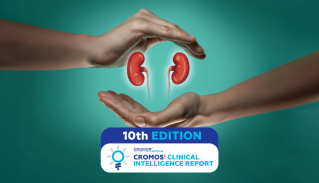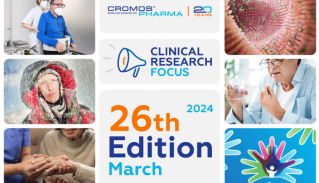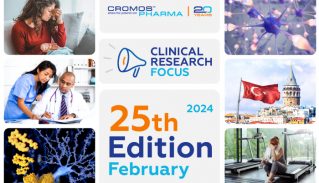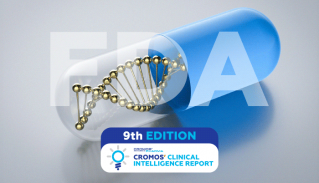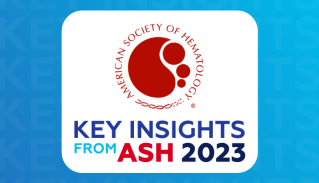
Clinical Research Focus. 6th Edition
Novartis Reports Final Positive Results of Zolgensma® Trial for Spinal Muscular Atrophy
Spinal muscular atrophy (SMA) is a serious disease, which can lead to irreversible loss of motor function and death. In the SPR1NT study, Novartis’ gene therapy Zolgensma® proved effective in preventing the onset of symptoms before reaching all age-appropriate stages in children with spinal muscular atrophy. The Phase III SPR1NT trial (NCT03505099) assessed early treatment with Zolgensma for babies with both two and three copies of the SMN2 gene. “When treated with Zolgensma prior to the onset of symptoms, not only did all 29 patients enrolled in SPR1NT survive, but they were thriving — breathing and eating on their own, with most even sitting, standing and walking without assistance,” said Dr Shephard Mpofu, Senior Vice President, Chief Medical Officer, Novartis Gene Therapies. Read the full article here.
Key Takeaways from the 2022 ASCO Annual Meeting
 Cromos Pharma’s CEO, Vlad Bogin, recently attended the ASCO Annual Meeting (Jun 3-7). “It was a great pleasure to participate in this year’s ASCO meeting, the first in-person event since the onset of the COVID-19 pandemic. While my primary interest is in getting to know the companies that are looking for a CRO partner, I am very intrigued by the new developments in cancer research,” said Vlad Bogin. Read his key takeaways from the event here.
Cromos Pharma’s CEO, Vlad Bogin, recently attended the ASCO Annual Meeting (Jun 3-7). “It was a great pleasure to participate in this year’s ASCO meeting, the first in-person event since the onset of the COVID-19 pandemic. While my primary interest is in getting to know the companies that are looking for a CRO partner, I am very intrigued by the new developments in cancer research,” said Vlad Bogin. Read his key takeaways from the event here.
Digital Healthcare is Here to Change The Healthcare Ecosystem
 Digital Healthcare is becoming integral to both drug discovery and patient care. The referenced article provides explanations of six key digital technology applications in healthcare: machine learning (AI &ML), artificial intelligence, telehealth, internet of things (IOT), augmented and virtual reality, NGS and 3D printing. These modern technologies serve to make treatment more targeted, reduce research costs and improve the effectiveness and quality of treatment. Read more here.
Digital Healthcare is becoming integral to both drug discovery and patient care. The referenced article provides explanations of six key digital technology applications in healthcare: machine learning (AI &ML), artificial intelligence, telehealth, internet of things (IOT), augmented and virtual reality, NGS and 3D printing. These modern technologies serve to make treatment more targeted, reduce research costs and improve the effectiveness and quality of treatment. Read more here.
What Biotech and Pharma Need to Consider about Decentralized Trials?
 The COVID-19 pandemic has propelled decentralized clinical trials to an entirely different level. Trial sponsors and CROs had to learn quickly how to utilize the key benefits of decentralized trial models and to apply them to their existing and upcoming trials with lightning speed. It is important to remember that apart from salvaging clinical trials during lockdowns, decentralized clinical trials have many other advantages: they can increase patient recruitment, retention and diversity while delivering high-quality data, all while making it easier for patients to participate. Read the considerations about decentralized clinical trials by Emily Mitchell, Executive Director, DCT Operations at ICON here.
The COVID-19 pandemic has propelled decentralized clinical trials to an entirely different level. Trial sponsors and CROs had to learn quickly how to utilize the key benefits of decentralized trial models and to apply them to their existing and upcoming trials with lightning speed. It is important to remember that apart from salvaging clinical trials during lockdowns, decentralized clinical trials have many other advantages: they can increase patient recruitment, retention and diversity while delivering high-quality data, all while making it easier for patients to participate. Read the considerations about decentralized clinical trials by Emily Mitchell, Executive Director, DCT Operations at ICON here.
Natural Killer Cell Immunity to the Rescue
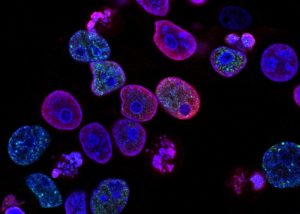 A new study led by the Penn State College of Medicine scientists has proven the ability of natural killer cells (immune cells) to activate T cells to attack melanoma tumors. Since T cells tend to wear out under the influence of cancer drugs, this study can make a significant contribution to the development of cancer treatment. “If T-cell-mediated immunity is no longer working, switching to an approach that activates natural killer cell-mediated immunity could be a major advancement,” said Gavin Robertson, Professor of Pharmacology, Pathology, Dermatology and Surgery, Penn State College of Medicine. Read more about the research here.
A new study led by the Penn State College of Medicine scientists has proven the ability of natural killer cells (immune cells) to activate T cells to attack melanoma tumors. Since T cells tend to wear out under the influence of cancer drugs, this study can make a significant contribution to the development of cancer treatment. “If T-cell-mediated immunity is no longer working, switching to an approach that activates natural killer cell-mediated immunity could be a major advancement,” said Gavin Robertson, Professor of Pharmacology, Pathology, Dermatology and Surgery, Penn State College of Medicine. Read more about the research here.
The First Systemic Treatment for Alopecia Areata is Here
 The first systemic treatment for alopecia areata was approved by the FDA. Olumiant (baricitinib) oral tablets can treat the disease, not only partially, as it used to be with other drugs. Olumiant is a Janus kinase (JAK) inhibitor which blocks the activity of one or more of a specific family of enzymes, interfering with the pathway that leads to inflammation. 32% of the 234 patients who received 4 milligrams (higher dose) of Olumiant achieved adequate scalp hair coverage, compared to 3% of the 156 patients who received a placebo. Read more about the study here.
The first systemic treatment for alopecia areata was approved by the FDA. Olumiant (baricitinib) oral tablets can treat the disease, not only partially, as it used to be with other drugs. Olumiant is a Janus kinase (JAK) inhibitor which blocks the activity of one or more of a specific family of enzymes, interfering with the pathway that leads to inflammation. 32% of the 234 patients who received 4 milligrams (higher dose) of Olumiant achieved adequate scalp hair coverage, compared to 3% of the 156 patients who received a placebo. Read more about the study here.
New Tech to Increase the Number of Screening Tests on a Single Solid Tumor Sample 50-fold
 The University of Strathclyde, U.K, developed a new screening tool, which can increase the number of tests on a solid tumor sample by up to 50 times. The platform was created for screening 3D tumor models to evaluate the toxicity of CAR-T therapy towards cells. “We are developing a technology platform which could accelerate the development of therapies and provide models which are much more representative of what happens in the body than what is currently available,” said Dr. Michele Zagnoni, a Reader in Strathclyde’s Department of Electronic and Electrical Engineering. Read more here.
The University of Strathclyde, U.K, developed a new screening tool, which can increase the number of tests on a solid tumor sample by up to 50 times. The platform was created for screening 3D tumor models to evaluate the toxicity of CAR-T therapy towards cells. “We are developing a technology platform which could accelerate the development of therapies and provide models which are much more representative of what happens in the body than what is currently available,” said Dr. Michele Zagnoni, a Reader in Strathclyde’s Department of Electronic and Electrical Engineering. Read more here.







